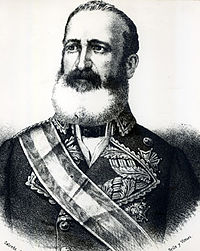Carlos María de la Torre y Nava Cerrada
| Carlos María Jose de la Torre | |
|---|---|
 |
|
| 99th Governor-General of the Philippines | |
|
In office June 23, 1869 – April 4, 1870 |
|
| Monarch | Amadeo I of Spain |
| Succeeded by | Rafael de Izquierdo |
| Personal details | |
| Born |
Carlos María de la Torre December,1,1850 Barcelona, Spain |
Carlos María de la Torre y Navacerrada was a Spanish soldier and politician. He served as Governor-General of the Philippines from 1869 to 1871, and is considered to be the most beloved of the Spanish Governors-General ever assigned in the Philippines.
A Carlist army officer, he was sent from Spain by Francisco Serrano after the ouster of Queen Isabel II as result of the La Gloriosa revolution. He was considered a liberal Spaniard who practiced the liberal and democratic principles for imposing liberal laws. He wanted to have the bronze statue of Isabel II, first unveiled in 1860, melted so that it would be put to better use. However, the Manila City Council saved it by declaring the statue municipal property.
He established the Guardia Civil in the Philippines and gave amnesty to rebels, of which the most prominent was Casimiro Camerino (El tulisán), the leader of bandits in Cavite. He organized the bandits given amnesty into an auxiliary force of the Guardia Civil. He abolished flogging, relaxed media censorship, and began limited secularization of education. He was also very close to the ilustrados, a group of Filipinos who understood the situation of the Philippines under Spanish rule. His supporters had done a Liberal Parade in front of the Malacañan Palace.
Only two weeks after the arrival of de la Torre as governor-general, Burgos and Joaquín Pardo de Tavera led a demonstration at the Plaza de Santa Potenciana. Among the demonstrators were José Icaza, Jácobo Zobel, Ignacio Rocha, Manuel Genato, and Máximo Paterno. The cry was "Viva Filipinas para los Filipinos!". In November 1870, a student movement, denounced as a riot or motín, at the University of Santo Tomas formed a committee to demand reforms on the school and its curricula. It later announced support of Philippine autonomy and recognition of the Philippines as a province of Spain. The committee was headed by Felipe Buencamino.
...
Wikipedia
